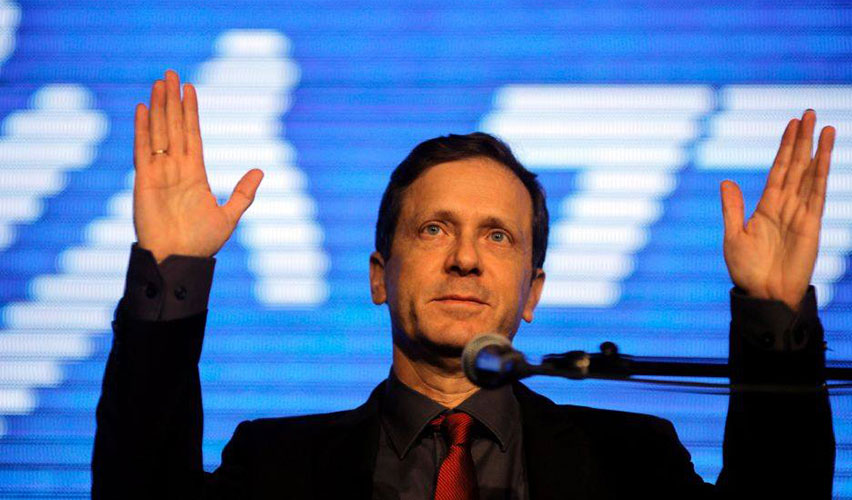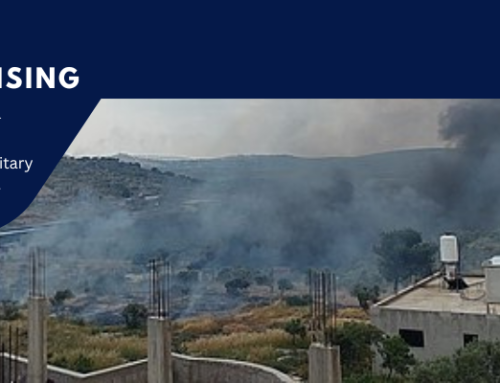Mikhael Manekin is the executive director of Molad, the Center for the Renewal of Israeli Democracy. Yesterday he posted the best response I have seen to Isaac Herzog’s Disengagement plan. In essence, he argues that plan looks more like a PR stunt than a real policy. Herzog avoids discussing real issues and does not offer solutions to most problems. But Manekin’s most significant contribution is his observation that Herzog simply fails to perceive himself as an alternative to Netanyahu. He cannot imagine a universe in which Netanyahu will not be Israel’s Prime Minister. This is an interesting psychological failure – one I had not expected of the leader of the opposition.
Translation by Maya Haber from The Hebrew original:
In recent weeks there has been talk about Isaac Herzog’s new plan and his argument that the two-state solution should be suspended until further notice. It is important to understand the real problems with Herzog’s plan. The plan calls for separation from the Palestinians. This is not new. It has been the Labor Party’s plan for the last few decades. Other than that, the program lacks content and looks more like a PR stunt, as if it was written by people who are seeking a magic formula rather than a political solution.
1. The plan is characterized by inconsistencies. It was presented at various forums and in different formats – Herzog’s speech, several interviews he gave to different media outlets, on the Labor Party’s website, in an email sent to party activists and in several Facebook posts. A different, and sometimes even contrary plan was presented in each instance. The most obvious example is that one text insisted on the pursuit of negotiations, while another text called on Israel to act unilaterally.
2. The plan is based on the separation lie. It is impossible to separate from the Palestinians without a Palestinian state. There cannot be a vacuum. Either Israel remains the sovereign or the Palestinians. And if there won’t be a Palestinian state, then Israel would have to continue controlling the area (the airspace, import, export, currency, borders, etc.). In other words, we can separate from the Palestinians but we will continue serving in reserve duty in the territories.
3. Herzog’s solution to the settlement problem – let’s not talk about it. The political highlight of Herzog’s plan is the completion of the separation fence. This makes sense and is certainly important. So, why have we not completed the separation fence? The answer is simple: In order to complete the separation fence, we have to make policy decisions about the settlements–which settlements remain in Israel proper and which stay out. And here comes the landmine most people do not realize: there are no recognized settlement blocs. There is no document or agreement that determines what the settlement blocs are. Settlers insist on legitimizing Ariel, for example. But Ariel is built deep in Palestinian territory and will require huge military resources to secure. Is Ariel a bloc? Is Jordan Valley a bloc? What about the settlements east of Ramallah (Beit El, Ofra, etc.)?
If Herzog wants to keep in Israel the settlements the Rightwing defines as blocs, including Kiryat Arba, for example – then we will never negotiate with the Palestinians. If he is plans on keeping only some, he should mention which. The expression “settlement blocs” is general and vague. And without deciding where to put the fence, the talk of its completion is nonsense.
4. On the Temple Mount and the Holy Basin question Herzog is back-stepping from the Labor Party’s platforms over the last decade. Pre-Herzog, the party’s position was that Jewish holy sites will remain in Israel’s sovereignty. But the Old City and the Holy Basin will be placed under “a special regime reflecting their international significance and centrality for all three religions.” Herzog, on the other hand, stipulated that the entire area would remain exclusively under Israeli control. This is a position that no Palestinian, no matter how moderate, can accept. So if the plan represents the position of the leader of the opposition — we can forget about negotiations not only for the foreseeable future, but forever.
5. What about Gaza? It’s easy to speak of the West Bank, where there is a Palestinian Authority, which cooperates with Israel in various ways. But there is another aspect to the conflict with the Palestinians — the Gaza Strip. We cannot just ignore it. A person considering himself a potential prime minister cannot present a solution which ignores half the challenge — especially when it’s the more complicated half.
6. Herzog is threatening Hamas. Strangely. – Herzog expressed his solution to Hamas’ violence by saying “We’ll employ an effective iron fist and shut down their radio and TV stations. After that they won’t have internet or mobile phone services. They won’t be able to transmit instructions to terrorists. We’ll take harsh and severe steps, including ones directed at their leaders.” If Herzog is referring to Hamas in Gaza, this statement is puzzling – because his plan does not even mention Gaza. If he is referring to Hamas in the West Bank – there Hamas is hardly a threat because its operatives are aggressively oppressed by Fatah. In the West Bank the real threat comes from unaffiliated individuals and harming Hamas’ infrastructure will not affect them at all. Here we can see the hand of PR professionals, who advised Herzog “throw in a sentence about Hamas and appear tough.”
7. A Settlement freeze is not a solution. We can build settlements or evacuate them. This decision should be derived from a defined strategy. Herzog’s plan to freeze construction in the settlements is illogical and meaningless — how long is he going to freeze settlements for? What’s the purpose? If you have no intention of evacuating settlements, there is no reason to freeze them. And if Herzog wants to evacuate settlements — why is it not in his plan?
8. Herzog wants a regional initiative — but he ignores the regional initiative. Much like Lieberman before him, Herzog emphasizes the importance of getting the moderate Arab countries of the region involved in solving the Israeli-Palestinian conflict. But these countries habe already published a plan: “the Arab Initiative” — their basis for a regional initiative. Herzog’s plan ignores the Arab Initiative and is far from the basic conditions it requires. Why would representatives of these countries bother to meet him?
9. Herzog is returning to the failed steps paradigm. “After a few years,” Herzog said, “if we’ll have quiet and security, we’ll decide what’s next.” Herzog seemed to have forgotten the Oslo Accord – a steps paradigm that failed dramatically. In Oslo too the leaders argued that the way to promote an agreement is to go step by step, and every year check where its working and decide what’s next. In practice, this steps plan froze 17 years ago, and we’re still stuck with it and are committed to it. This failed paradigm is what led to this harmful and complex situation in the occupied territories. In the 1990s the leaders did not know the implications of the steps paradigm so they made a mistake. But why repeat the same mistake again?
10. Herzog’s legal language disguises the reality. Herzog’s plan does not mention “outposts” (Ma’akhzim) and certainly not “illegal outposts” – instead it speaks of settlments (He’akhzuyot). Herzog’s plan does not “transfer an area,” but “gets rid of terrorist localities.” Instead of channeling energies to constructing a serious plan, Herzog’s energies were devoted to designing slippery formulations to confuse readers. A real political plan — any plan — requires concessions and difficult decisions. To prepare public opinion to accept a new vision and make it viable requires explaining the plan’s costs and why they are worth it. This is why Ariel Sharon chose to use the loaded word “occupation” when he decided to evacuate the Gaza Strip. He understood that his role as a leader is to prepare the public for his vision. Herzog’s cowardly formulations are neither clear and nor would they recruit the public. And beyond that, those who are afraid of uttering the words “evacuate settlements” will not evacuate settlements.
11. Netanyahu is the eternal Prime Minister. ” It is impossible to implement the two-state solution as long as Netanyahu is the PM,” Herzog said on Meet the Press. In other words, the main reason Herzog gave up on the two-state solution is that the Right is in power. This is a strange starting point for a political plan, which expresses Herzog’s agenda for the day he will be in power. If Herzog leads, why does it matter what Netanyahu wants? And why does Herzog refer to Netanyahu as a constant factor in the equation if he wants to replace him?
12. Netanyahu is right. The most problematic point in Herzog’s document is that his worldview is identical to Netanyahu’s — “We will forever live by the sword.” All we can do is buy time between one boxing round and another. It will never be possible to live a normal life in Israel. And the best we can aspire to is a better fence. This approach is hopeless. It assumes that Israeli citizens are not responsible for their own fate and enemies will always sit on the fences. First, this is not true. But more importantly, this approach does not reflect reality except the reality that Netanyahu produces. We have already understood in the previous section that Herzog cannot imagine a prime minister that isn’t Netanyahu. But, why fight with Netanyahu if the opposition leader shares his worldview?





An excellent article Maya. Thanks for bringing it to our attention with this translation. A genuine challenge to Herzog, and also to Tom Friedman’s analysis in his recent NY Times aticle.
Hillel
Hillel Schenker
Co-Editor
Palestine-Israel Journal
http://www.pij.org
[…] to separate from the Palestinians without a Palestinian state. There cannot be a vacuum,” wrote Mikhael Manekin, executive director of the Israeli think tank Molad. “Either we (Israel) are the […]